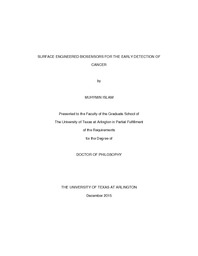
ATTENTION: The works hosted here are being migrated to a new repository that will consolidate resources, improve discoverability, and better show UTA's research impact on the global community. We will update authors as the migration progresses. Please see MavMatrix for more information.
Show simple item record
| dc.contributor.author | Islam, Muhymin | |
| dc.date.accessioned | 2016-02-24T20:24:03Z | |
| dc.date.available | 2016-02-24T20:24:03Z | |
| dc.date.issued | 2015 | |
| dc.date.submitted | January 2015 | |
| dc.identifier.other | DISS-13353 | |
| dc.identifier.uri | http://hdl.handle.net/10106/25588 | |
| dc.description.abstract | Cancer commences in the building block of human body which is cells and in most of the cases remains silent at early stage. Diseases are only expressed at molecular and cellular level at primary stages. Recognition of diseases at this micro and nano level might reduce the mortality rate of cancer significantly. This research work aimed to introduce novel electronic biosensors for for identification of cancer at cellular level. The dissertation study focuses on 1) Label-Free Isolation of Metastatic Tumor Cells Using Filter Based Microfluidic device; 2) Nanotextured Polymer Substrates for Enhanced Cancer Cell Isolation and Cell Growth; 3) Nanotextured Microfluidic Channel for Electrical Profiling and Detection of Tumor Cells from Blood; and 4) Single Biochip for the Detection of Tumor Cells by Electrical Profile and Surface Immobilized Aptamer. Standard silicon processing techniques were followed to fabricate all of the biosensors. Nantoextruing and surface functionalizon were also incorporated to elevate the efficiency of the devices.The first approach aimed to detect cancer cells from blood based on their mechanophysical properties. Cancer cells are larger than blood cells but highly elastic in nature. These cells can squeeze through small microchannels much smaller than their size. The cross sectional area of the microchannels was optimized to isolate tumor cells from blood. Nanotextured polymer substrates, a platform inspired from the natural basement membrane was used to enhance the isolation and growth of tumor cells. Micro reactive ion etching was performed to have better control on features of nantoxtured surfaces and did not require any template. Next, electrical measurement of ionic current was performed across single microchannel to detect tumor cells from blood. Later, nanotexturing enhanced the efficiency of the device by selectively altering the translocation profile of cancer cells. Eventually aptamer functionalized nanotextured polymer surface was integrated with current measurement facilities in a single biochip to discriminate tumor cells from blood with higher efficiency and selectivity. This biochip can be an implemented as a point-of-care device for the early detection of cancer at cellular level. | |
| dc.description.sponsorship | Iqbal, Samir M. | |
| dc.language.iso | en | |
| dc.publisher | Electrical Engineering | |
| dc.title | Surface Engineered Biosensors For The Early Detection Of Cancer | |
| dc.type | Ph.D. | |
| dc.contributor.committeeChair | Iqbal, Samir M. | |
| dc.degree.department | Electrical Engineering | |
| dc.degree.discipline | Electrical Engineering | |
| dc.degree.grantor | University of Texas at Arlington | |
| dc.degree.level | doctoral | |
| dc.degree.name | Ph.D. | |
Files in this item
- Name:
- ISLAM_uta_2502D_13353.pdf
- Size:
- 4.887Mb
- Format:
- PDF
This item appears in the following Collection(s)
Show simple item record


